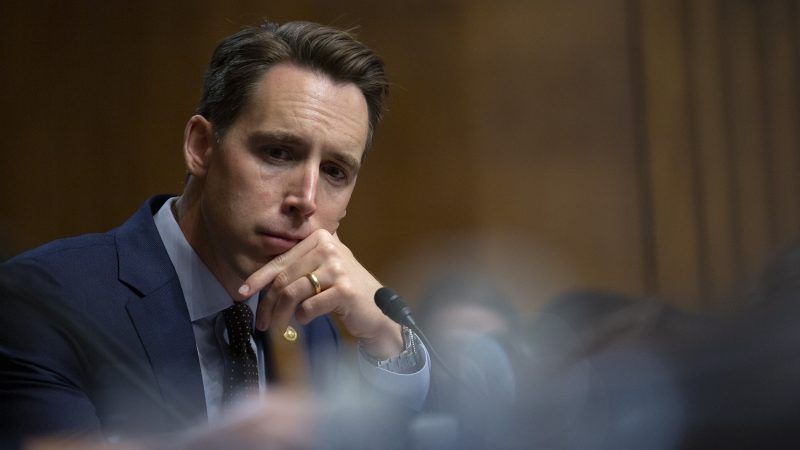Josh Hawley Says Libertarians Who Defend Tech Are Enamored with Power. He Should Look in the Mirror.
The populist senator's campaign against social media addiction is unscientific and anti-freedom.

Sen. Josh Hawley (R–Mo.) had an eventful Thursday, meeting with Facebook CEO Mark Zuckerberg for a "frank conversation."
"[I] challenged him to do two things to show FB is serious about bias, privacy & competition," wrote Hawley on Twitter. "1) Sell WhatsApp & Instagram 2) Submit to independent, third-party audit on censorship. He said no to both."
Well, that escalated quickly.
It is discouraging that an ostensible conservative would make it his personal crusade to destroy the Big Tech boogeyman by ceaselessly threatening government intervention. But this is the path Hawley has chosen. Oddly, he thinks libertarians should be applauding him for it.
"I don't understand why those who call themselves libertarians are so enamored with this incredible concentration of power in the hands of a few," he told The Hill's Saagar Enjeti in a recent interview. "I thought the whole libertarian tradition was about standing up to power. It was about checking concentrated power on behalf of the people."
Hawley clearly knows enough about libertarianism to cynically distort the language of freedom in service of his authoritarian populist designs. As he is likely aware, the libertarian tradition is about standing up to the most dangerous concentration of power: the one that results from government intervention and is maintained by the threat of government force. Libertarianism is against the efforts of central planners in Washington, D.C., who think they know better than individuals what kind of products they should buy and what kind of media they should consume. In effect, libertarianism means opposing Josh Hawley.
If anyone still doubts that the senator from Missouri wants to bend the tech companies to his will and dictate to the rest of us the terms under which we will use their services, the interview with Enjeti should remove all suspicion. Hawley spoke positively about banning or limiting specific features of tech products that he has arbitrarily determined are harmful for children. Echoing the Bernie Sanders campaign and the Democratic Socialists of America, he criticized Uber and Amazon for not paying their workers enough. He accused tech companies of "exploiting" customers who voluntarily use their products.
"The whole business model is built on exploitation of consumers, of families, of individuals, of children in many cases," he said.
Again, Hawley is using libertarian language for anti-libertarian ends. He praises marketplace competition—something libertarians favor—but speaks as if it should be Google's job to produce a crappier product for consumers so that some other search engine gets a chance at stardom.
"We need competition in that market," he said. "We're seeing a really troubling pattern that these monopoly size entities, Google, Facebook, Amazon, are using their tremendous market power to favor their own businesses, favor their own products, and to disfavor competitors. Who loses in that is the American people, as well as our privacy, as well as our children."
The crusaders of the nanny state have long used that phrase—"our children"—to limit all sorts of freedoms for people of all ages. The Trump administration in D.C. and Democratic governors in Michigan and New York are currently trying to prevent adults from buying e-cigarettes out of a misguided notion that there is some vaping epidemic on teenagers. Vaping is probably significantly safer than traditional tobacco products, but never mind: The government must drive addicts back to their traditional cigarettes, or to black market vaping products. Why? For the children, naturally.
Similarly, Hawley thinks the safety of children requires the government to limit everyone else's ability to use the internet on their own terms. Here's what he had to say about social media:
Look at the track record Silicon Valley has given us. I refer to in particular social media, the pathologies associated with social media in the last decade or so: the data that comes to us about the correlation between social media usage and teenage suicide and teenage depression and teenage loneliness. We need more information, it's still early days, but what we're seeing so far is very very worrisome. The business model is to get us to spend as much time online as possible, take as much information from us as they can without telling us, and then sell it without our consent or otherwise profit from it. That whole business model is built on exploitation of consumers, of families, of individuals, of children in many cases.
But the science of screen addiction is far from settled. A recent study, for instance, found that teens who spent more time on their phones were no worse off than other kids. Some of them were happier, in fact. This finding makes sense when one considers what teens are actually doing on their phones: staying in touch with friends. It's no wonder this actually contributes to their happiness.
Hawley framed his anti-tech screed as a plea for parents to have more options.
"Parents ought to be in control of raising their children, not Big Tech," he said. "Parents ought to have tools of support. If I am comfortable with my kids online, that's your choice, but it shouldn't be Big Tech's choice. Power of choice should be in the hands of the family."
But if parents want more of these kinds of choices, the companies will provide them. Hawley doesn't need to force Facebook to provide features if these features are actually popular with consumers. What Hawley is really saying is that he knows better than the kids, better than their parents, and better than Mark Zuckerberg what people want and should have. It is not libertarians who are enamored with centralized power—it's Hawley himself.

Show Comments (47)